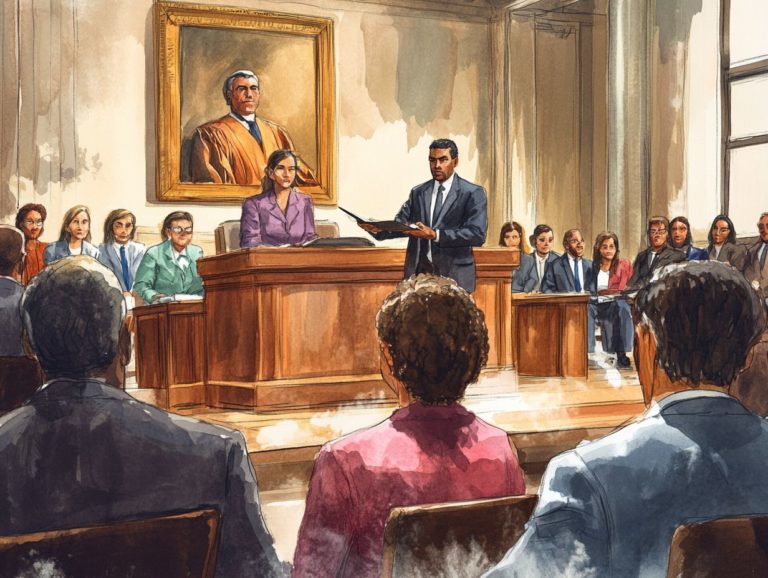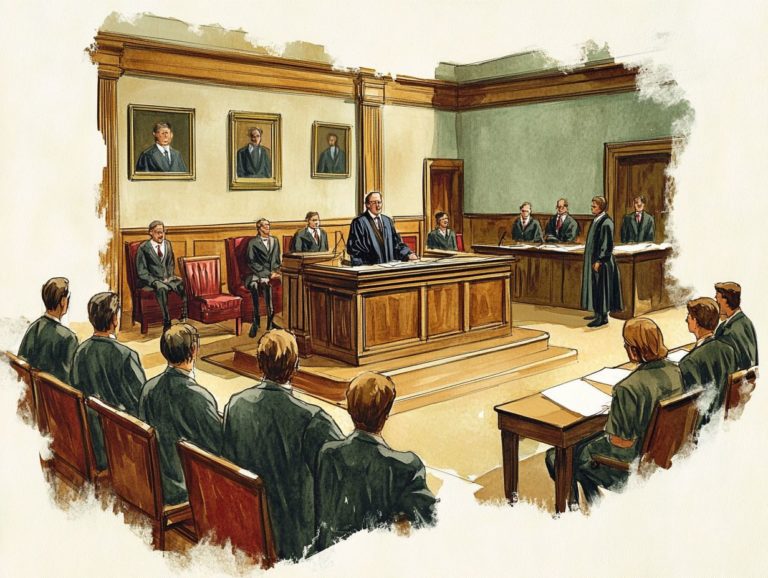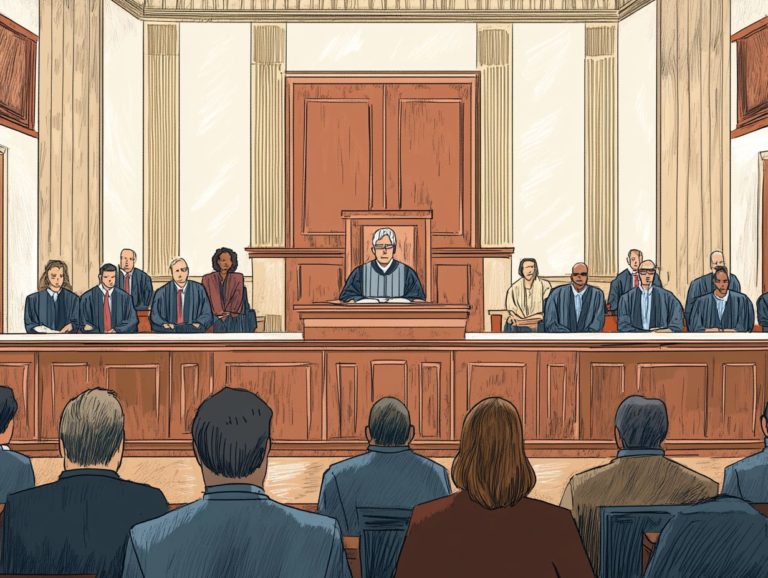How to Navigate a Criminal Investigation?
Navigating a criminal investigation can feel like stepping into a labyrinth, fraught with uncertainty and complex legal processes. This guide is your key to navigating the complexities of criminal investigations with confidence! It breaks down the investigation journey from the initial steps and key players to the critical task of gathering evidence and responding to law enforcement.
It delves into your rights and responsibilities, offering strategies for effectively collaborating with a lawyer and preparing for potential outcomes. It also covers how to manage the aftermath, empowering you to safeguard your reputation and move forward with assurance.
Whether you find yourself in the midst of an investigation or simply seeking knowledge, this guide equips you with the insights you need to navigate this challenging terrain.
Contents
- Key Takeaways:
- Understanding the Criminal Investigation Process
- Preparing for a Criminal Investigation
- Responding to Law Enforcement
- Navigating the Legal System
- Possible Outcomes of a Criminal Investigation
- Understanding the Different Verdicts
- Dealing with the Aftermath of a Criminal Investigation
- Maintaining Reputation and Moving Forward
- Frequently Asked Questions
- What is the purpose of a criminal investigation?
- What are the first steps to take when navigating a criminal investigation?
- Can I be implicated in a criminal investigation even if I am not the main suspect?
- What should I do if I am a suspect in a criminal investigation?
- How long does a criminal investigation typically last?
- What happens if the evidence gathered in a criminal investigation is insufficient?
Key Takeaways:

Know the steps and parties involved in a criminal investigation to better understand the process. Gather evidence and witnesses in preparation for a criminal investigation to present a strong defense. Understand your rights and responsibilities when responding to law enforcement during a criminal investigation.
Understanding the Criminal Investigation Process
Grasping the criminal investigation process is vital for understanding how law enforcement agencies, like the FBI and the Department of Justice, manage cases from the moment a crime is reported to the final court resolution. This complex process comprises several steps, including preliminary investigations, evidence collection, and case analysis.
These steps ensure a thorough examination of the facts surrounding a crime while respecting the principles of criminal justice and upholding victims’ rights. Each phase is crucial in shaping the direction of a case and influencing its ultimate outcome.
Overview of Steps and Parties Involved
The criminal investigation process unfolds through critical steps and involves key players, including police investigators, prosecutors, defense attorneys, and jurors each essential to the pursuit of justice.
It all begins with the meticulous gathering of evidence. Detectives collect physical material, witness testimonies, and forensic data. From there, a case strategy takes shape, with every step being fundamental to the process.
Police investigators collaborate with forensic experts to analyze crime scenes, while prosecutors craft the narrative destined for the courtroom. On the flip side, defense attorneys prepare to challenge the evidence and advocate for the defendant’s rights.
As the trial progresses, jurors carefully review the facts and arguments laid before them, ultimately tasked with deciding the verdict. This intricate interplay ensures a thorough examination of the evidence, highlighting the complex nature of the judicial system.
Preparing for a Criminal Investigation
Preparing for a criminal investigation requires careful planning and execution, especially during the critical phase of crime scene investigation.
At this stage, the collection and processing of forensic evidence, which includes scientific data from crime scenes, are paramount to constructing a robust case. It s essential for law enforcement to prioritize victims’ rights, cultivating trust and cooperation between victims and investigators.
Gathering Evidence and Witnesses
Gathering evidence and witnesses is a crucial aspect of the criminal investigation process. The information you collect can profoundly influence police inquiries and subsequent court proceedings.
Effective evidence collection requires systematic methods that ensure every relevant fact is captured accurately. This entails documenting crime scenes, utilizing photography, and gathering physical evidence that could serve as critical components in court.
Witness statements are equally essential, offering firsthand accounts that can corroborate or challenge other evidence, enriching the narrative of the case. Forensic evidence, such as DNA or fingerprint analysis, often becomes a key element in securing a conviction.
By employing advanced techniques and technology, you can extract reliable information that upholds the integrity of the entire case.
Understanding your rights during an investigation is not just important; it could be crucial to your case! If you’re facing a situation like this, seeking legal advice is essential. Don t hesitate to contact a lawyer for your specific situation.
Responding to Law Enforcement

Responding to law enforcement is a vital part of the criminal justice process. This is especially true for victims like yourself.
It’s crucial to be aware of your rights, including the right to legal representation and the protections under Miranda rights.
Understanding these rights is essential. They help you navigate the legal system after an arrest warrant or police inquiry.
Rights and Responsibilities
Victims and defendants have distinct rights and responsibilities in the criminal justice system. This includes the right to legal representation and considerations regarding bail during your first court appearance.
The legal framework ensures that victims can voice their experiences during proceedings. This includes submitting victim impact statements that can influence sentencing decisions.
Defendants are entitled to a fair trial. This principle upholds their presumption of innocence until proven guilty. It also allows for the submission of evidence and confronting witnesses.
However, these rights come with legal obligations. Victims often need to cooperate with investigations. Defendants must comply with court orders and respect the legal process.
Knowing your rights and responsibilities can make a huge difference in your case!
Navigating the legal system can feel overwhelming. Whether you’re facing a criminal charge as a defendant or dealing with the aftermath as a victim, it s challenging.
The complexities of the trial process, the roles of defense attorneys and prosecutors, and the nuances of plea deals all contribute to this challenge.
Understanding these elements is crucial. It helps you make informed decisions that could significantly affect your case outcome.
Working with a Lawyer
Having a lawyer is crucial for anyone involved in a criminal case. A lawyer can greatly affect your case results, whether you choose a private defense attorney or a public defender.
It’s important to understand the different types of lawyers available. Their expertise allows them to tailor defense strategies to your unique situation.
Criminal defense lawyers specialize in criminal matters. They ensure you navigate the complexities of the legal process with confidence.
Specialized attorneys, such as those focusing on appeals or specific charges like DUI or domestic violence, offer targeted guidance based on their deep knowledge of particular legal nuances.
Regardless of the type of representation you choose, having a qualified lawyer by your side ensures your rights are protected. This helps to level the playing field against the prosecution.
Possible Outcomes of a Criminal Investigation
The outcomes of a criminal investigation can vary significantly. They encompass everything from acquittals and plea deals to convictions and sentencing.
Each of these outcomes hinges on the evidence presented throughout the trial process and the jury selection that occurs beforehand.
Understanding these potential results is essential for both defendants and victims. This knowledge helps you navigate the complexities that arise after a criminal case.
Don’t wait! Get the right legal help today!
Understanding the Different Verdicts

Understanding the various verdicts that can emerge from a trial process is crucial for appreciating their implications for both defendants and victims. You will encounter outcomes such as guilty, not guilty, or a hung jury. Each carries its own weight in the justice system.
A guilty verdict means the defendant is guilty. This often leads to sentencing involving fines, imprisonment, or probation. Such decisions can drastically alter the trajectory of their future.
In contrast, a not guilty verdict does not automatically mean innocence. It indicates that the prosecution failed to meet its burden of proof. This leaves the defendant free, but they may still face reputational challenges afterward.
A hung jury occurs when jurors cannot reach a consensus, resulting in a mistrial. This situation gives the prosecution the option to pursue a retrial or drop the case altogether.
Ultimately, the verdict you encounter shapes the lives of those directly involved and influences the broader community’s perception of justice.
Dealing with the Aftermath of a Criminal Investigation
Navigating the aftermath of a criminal investigation presents unique challenges for both victims and defendants. You must prioritize your reputation, fully understand victim rights, and carefully analyze the case as it unfolds.
A victim impact statement can also be influential. It sheds light on the emotional and psychological effects of the crime, ensuring your voice is heard in the process.
Maintaining Reputation and Moving Forward
Maintaining your reputation and moving forward after a criminal investigation is a delicate balancing act. This is particularly true for victims who must navigate social perceptions and emotional recovery while ensuring their rights are upheld.
During such challenging times, it is essential to build a robust support network. Friends, family, and mental health professionals can provide emotional stability, aiding in recovery and helping counter any negative stigma.
Engaging in community discussions fosters understanding and empathy, promoting a restorative approach that benefits everyone involved. Using social media wisely and maintaining transparency can also play significant roles in rebuilding trust.
By actively managing your narrative, you can reclaim your voice and reshape how you are perceived while ensuring you have the necessary platforms for healing and growth.
Frequently Asked Questions
What is the purpose of a criminal investigation?
A criminal investigation gathers evidence and information to determine whether a crime has been committed and to identify the person responsible.

The first steps include reporting the crime to law enforcement, providing any available evidence or information, and cooperating with the authorities.
Can I be implicated in a criminal investigation even if I am not the main suspect?
Yes, you can be implicated in a criminal investigation as an accomplice or witness. It is important to be truthful and provide any relevant information to assist in the investigation.
What should I do if I am a suspect in a criminal investigation?
If you are a suspect, remain calm and invoke your right to remain silent. Seek legal counsel immediately to guide you through the investigation process.
How long does a criminal investigation typically last?
The length of an investigation varies based on the case’s complexity and the evidence needed. It can take anywhere from a few weeks to several years to complete.
What happens if the evidence gathered in a criminal investigation is insufficient?
If there isn t enough proof of a crime or who did it, the investigation might end. But don’t lose hope! There s always a chance to uncover new clues.






